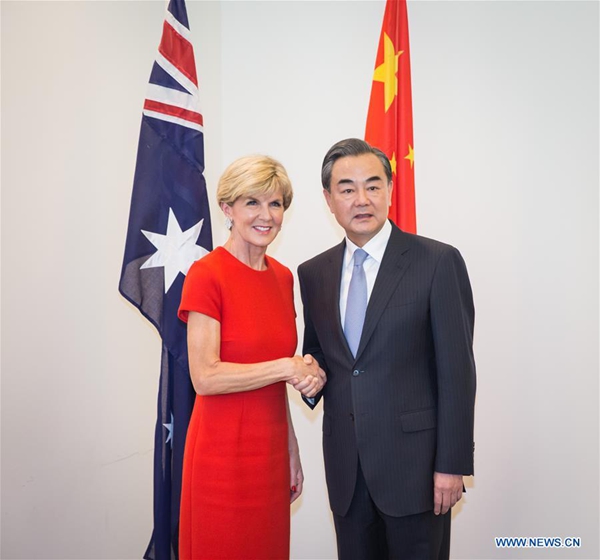Dilemma down under
china.org.cn / chinagate.cn by Sumantra Maitra, February 8, 2017 Adjust font size:
|
|
|
Chinese Foreign Minister Wang Yi (R) shakes hands with his Australian counterpart Julie Bishop prior to the two countries' fourth round of diplomatic and strategic dialogue in Canberra, Australia, Feb. 7, 2017. Foreign ministers of China and Australia called for further strengthening of bilateral ties here on Tuesday. (Xinhua/Zhu Hongye) |
China's Foreign Minister Wang Yi is visiting Australia and New Zealand from February 7 to 10, and will meet the Australian FM Julie Bishop. "Visiting Australia and New Zealand at the beginning of the Chinese New Year highlights the importance China gives to growing relations with these two countries," China foreign ministry spokesman Lu Kang was quoted to say on Saturday.
The trip comes at a time of heightened tensions, and uncertainty in Asia, particularly in the South China Sea and around the Korean peninsula. It also comes amidst the relative uncertainty with regards to American intentions and relations with allies in the Pacific region. The importance of this trip can be understood from the official communiqué of the Chinese administration, as it is marked as a trip to solidify the full commitment and demonstration of the Chinese side for Australia.
This is clearly an interesting development. Trump's ascendance to power opened up new developments and contingencies which no one, much less no regional powers anticipated. Trump has openly threatened a trade war with China, which to put it simply, will be devastating for Asia and the global economy. It will also ultimately persuade other powers to join a new economic order, which I explained in a column earlier.
After Chinese President Xi's Davos speech, it is increasingly clear the choice around the world is between protectionism and free markets. While it is still unclear as to how much Trump actually can or is willing to continue with protectionism, and even if he does how much will he be able to continue when the losses start pouring in for American companies and consumers, other powers are already keeping the eventualities in consideration.
For example, recently after the U.S. cancelled TPP, Australia hinted that it is open to China and Indonesia joining. While stating that it is a big loss, and being optimistic that the U.S. would join in the future, Australia said that they are having talks with Canada, Mexico, Japan, New Zealand, Singapore, Malaysia, Chile and Peru to go through with the deal, without the U.S. Australia also hinted that major economic muscle is needed, and the original treaty allows other countries to join in, which is a major hint to China.
There's something else fundamentally at play. Australian closeness and dependence on Asian trading partners is precisely the reason, it has a mining boom, and it didn't face the global financial crisis as devastatingly as the West, which was crippled in 2008. Statistics reveal that in 2011, China accounted for almost one-quarter of all Australian goods trade. Around the same time according to a poll, over 75 percent of the people in Australia were satisfied with Chinese trade.
But there's a new fundamentally different debate that has started down under, one that encompasses a radically changing scenario in the Pacific. Australia has been a steadfast ally of the U.S. since the Second World War, going to wars in Vietnam and Iraq for example. But how far is Australia willing to take sides when it comes to a great power conflict or confrontation in Asia?
A proxy war, trade war, or even an outright war in Asia will be devastating, but most importantly it will force regional powers to choose sides. For example, in a given trade war, between the U.S. and China, China will understandably retaliate. Given the lack of imports from the U.S., it will then be on Australia to provide the deficit in meat and dairy for example. Will Australia do it and choose Chinese trade over an American alliance?
The second debate is about security. If there's a conflict or proxy war in Asia, especially in the Korean peninsula or the South China Sea, will Australia and New Zealand take sides? With the recent hostile Trump's phone call with the Australian PM Turnbull, these debates are even more prominent. Apparently it was extremely rude and undiplomatic, which is classic Trump.
Unfortunately the question in Australian strategic circles is how much does an alliance benefit Australia -- if after rock solid support of over 45 years is rewarded with humiliation. And what are the costs of jeopardizing trade with China in a changing world.
These are the questions which will be at the forefront. Ultimately, the choice might just be simple, between trade and peace or destabilization and proxy war.
Sumantra Maitra is a columnist with China.org.cn. For more information please visit:
http://www.china.org.cn/opinion/SumantraMaitra.htm
Opinion articles reflect the views of their authors only, not necessarily those of China.org.cn.
